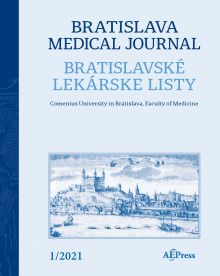Bratislava Medical Journal Vol.125, No.2, p.102–106, 2024
|
| Title: Clinical utility of biomarkers of hepatocellular carcinoma |
| Author: Abdul Fatawu MOHAMMED, Xu CHEN, Chengbin LI |
|
Abstract: Hepatocellular carcinoma (HCC) is one of the most common forms of cancer significantly affecting the mortality and morbidity rates. The increasing incidence of HCC is a great concern across the globe. The current methods of HCC screening, detection and diagnosis depend mainly on imaging techniques. However, biomarkers represent a relatively easy and noninvasive way to detect and estimate the disease prognosis. New potential biomarkers such as α-fetoprotein (AFP), des‑γ‑carboxyprothrombin (DCP), α-fetoprotein L3 (AFP-L3), glypican 3 (GCP3), micro-RNA, and Golgi-protein 73 (GP73) are being used more often in the diagnosis and prognosis of HCC. The lack of prudent diagnostic measures makes early detection of HCC nearly impossible. The use of biomarkers to detect cancer has helped to screen for the disease. However, the most commonly used biomarkers for HCC have inadequate performance characteristics. Despite numerous efforts to identify molecules as potential biomarkers, there is no single ideal marker for HCC. In this paper the main biomarkers for the surveillance, diagnosis and prognosis of HCC are reviewed. The advantages and limitations of these biomarkers are summarized, and the future development directions are proposed (Tab. 1, Ref. 30).
|
|
| Keywords: hepatocellular carcinoma, biomarkers, AFP, DCP, diagnosis |
|
|
Published online: 14-Jan-2024
|
| Year: 2024, Volume: 125, Issue: 2 |
Page From: 102, Page To: 106 |
doi:10.4149/BLL_2024_016
|
|
 download file download file |
|
|
|
|
 download file
download file
